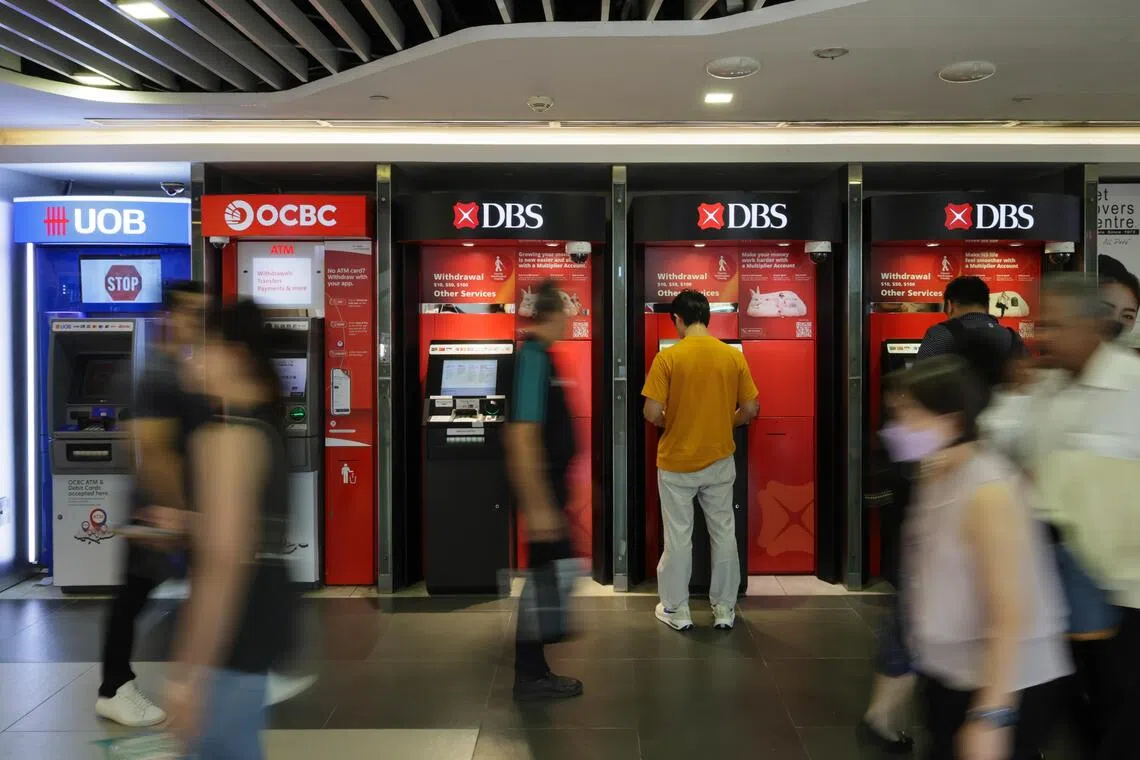Financial and insurance sector to leverage role-specific AI tools in new programme
Sign up now: Get ST's newsletters delivered to your inbox

The programme will facilitate peer learning and feature successful cases in varied functions.
ST PHOTO: GIN TAY
- Singapore launches PathFin.ai, a programme to help over 80 financial institutions improve AI implementation through peer learning and sharing successful use cases.
- MAS will clarify AI risk management guidelines and supports workforce preparation via a "job transformation map" with McKinsey and Workforce Singapore.
- Banks like DBS are upskilling employees in AI literacy; relationship managers use AI tools to improve efficiency, freeing time for customer relations.
AI generated
SINGAPORE – More than 80 financial institutions in Singapore will be able to tap resources to improve their artificial intelligence (AI) implementation under a new programme called PathFin.ai.
The programme will facilitate peer learning and feature successful cases in varied functions like sales and marketing, customer operations, risk management, engineering and tech.
The Monetary Authority of Singapore (MAS) will work with industry partners to progressively enhance the knowledge hub as part of efforts to reduce the time taken to implement AI solutions, said National Development Minister Chee Hong Tat at an award ceremony on Oct 9.
The annual event was organised by the Institute of Banking and Finance (IBF) to celebrate excellence in the financial sector.
For the sector to remain competitive and continue creating good jobs for Singaporeans, Mr Chee, who is also MAS deputy chairman, said financial institutions – big and small – must adopt AI efficiently, effectively and responsibly.
He added that MAS will provide greater clarity on its AI risk management guidelines, so that companies can have the confidence to experiment and innovate with AI.
“We hear feedback that clearer supervisory expectations would support your AI innovation because as you look to embed AI use across more business functions, you want to be clear. You don’t want to run afoul of the rules and regulations,” he said.
“We want to also help you improve your operational processes and help manage risks in areas such as scams and money laundering. AI can help us – as tools – to become more effective and efficient in dealing with these risks.”
He urged all financial institutions to sign up, contribute, learn and grow as a community.
Speaking to guests at the gala dinner at Marina Bay Sands Expo and Convention Centre, Mr Chee said: “We see value in fostering knowledge exchange to help to uplift and upgrade the entire sector.
“Beyond upgrading our AI ecosystem, it is equally important to prepare our workforce for an AI-enabled future.”

Minister for National Development Chee Hong Tat speaking at the Institute of Banking and Finance gala dinner on Oct 9.
PHOTO: INSTITUTE OF BANKING AND FINANCE
To help the workforce seize these opportunities, Workforce Singapore, MAS and IBF worked with management consulting firm McKinsey to study how generative AI could potentially reshape jobs and skills in the local financial sector.
Called the “job transformation map”, it highlighted that over the next five years, tasks involving information collection, matching and summaries can be automated.
This allows workers to focus on higher-value activities such as enhancing customer experiences, developing new products or managing risks.
Role-specific AI tools
The initiative saw 10 pilot financial institutions, including DBS, HSBC, Manulife, OCBC and UOB, serving as a test bed to study what AI adoption can look like for specific job roles in the sector.
The three local banks – DBS, UOB and OCBC – have committed to uplifting the AI literacy of all their 35,000 employees in Singapore in the next one to two years. More than half have been trained.
One of the key outcomes from the pilots was recognising that foundational skills like prompt design, AI principles, and governance and ethics will be needed across roles. Another outcome was learning that workers will have to use role-specific AI tools to perform higher-value work.
For example, relationship managers at Bank of Singapore used an AI tool to help draft source-of-wealth reports for private banking clients, which significantly reduced preparation time from 10 days to one hour.
When Ms Rosepriya Chidambaram, 31, joined DBS in 2015, she started out as a bank branch counter staff member before moving on to various call centre roles.
In July 2025, she transitioned to a relationship manager role to manage corporate clients, and appreciated AI tools like iCoach,
“Our in-house tool DBS-GPT helps me to summarise information and proofread e-mails,” she said, affording her more time to deepen relationships with her customers.
The bank, which committed to upskilling 12,000 employees in 2025, won the inaugural Workforce Transformation Award at the ceremony. In today’s dynamic landscape, said the bank’s head of group human resources Lee Yan Hong, no single organisation can transform alone.
“Businesses can only transform when people do and that’s why we are deeply committed to workforce transformation.”


